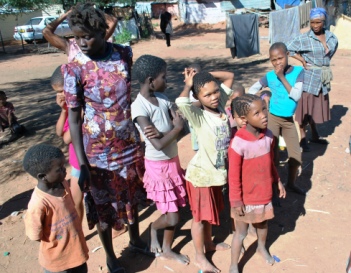
By now you might be thinking this; these street children, these vulnerable nippers in Epako (or in any former township in southern Africa) who helps them to survive? Why don’ t they have parents around?
There are many answers to the last question. Disease is the biggie. HIV/AIDS being the obvious one. Once the body’s immune system has become so weakened – thanks to the horror of the HIV – more often than not a person dies simply due to a common cold or a minor infection. They also may not even aware that they have HIV. They don’t take the test, or ask for help. Sometimes because of stigma. Sometimes they feel that life is hard enough without having yet more bad news. So preparations and plans are not made for the care of their children after their death. (Best not to think …) And of course, other diseases are massive killers. We lost many friends in Namibia due to TB and malaria.
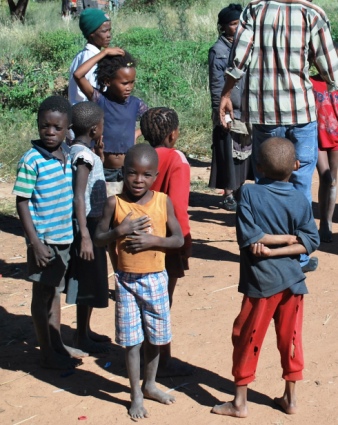
Some adults simply cannot cope with being a parent and simply disappear from their children’s lives. Others have far too many kids already to cope with. Some form new relationships and have more children with a new partner. Kids from previous relationships may often be neglected or spurned because of a jealous husband or wife. Poor mental health and suicide is a huge cause for concern in Namibia – and domestic abuse and the murder of women is sadly, on the increase.
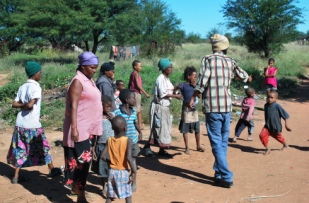
So for the little ones who have just one surviving parent, or who have none at all – where do they go? Who keeps an eye out for them? Usually the extended family try and help, but all too often when faced with poverty such as here, at the tail-end of Epako, they simply cannot cope with another mouth to feed. On the photos and videos on this blog over the last few days here, you will have seen several women. Most of them kind aunties or grandmas or simply warm-hearted neighbours who have been doing their best to look out for the ‘street children.’ Certainly none of them profit in any way through helping the kids. No, it’s the opposite. This is one more mouth to feed to them. But they do it still.
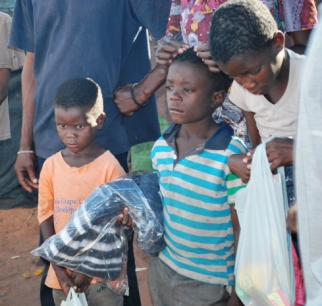
We returned to the poorest corners of Epako with children bearing their new school uniforms in bags and then my own kids did their best to distribute blankets and toiletries and the torches and gifts from the British children. At this point I was besieged with thoughts of simply scooping up just a couple of the children and taking them home with us. (Not like me I know. Normally I’m trying to dump my own kids on someone else so that I can get a breather and visit the nearest nail-bar or beauty salon – yeah, right.)
I wondered how Madonna and Angelina managed to do it. In Namibia it is incredibly difficult – nigh on impossible – to be a foreigner and to adopt a child if you intend on leaving the country with them. Of course, if you are a filthy-rich celeb it always helps. (I still haven’t forgiven Angelina for the fact that she and Brad flew to Namibia for 6 weeks in order to have their child and were granted Namibian citizenship for baby Shiloh – whilst us lot – scummy charity workers just down the road who actually lived, worked and gave birth there – were not allowed such a privilege for our daughter, when we asked for Namibian citizenship for her! Outrageous!) I wondered if there was any way that we could take a child home with us and to give them … just basic food and schooling. To give them some love and a smidgen of much-needed attention (when I’m not blogging, of course.)
But – practicalities and silly day-dreaming aside – I wasn’t sure if this is the right thing to do. Or whether it is the wrong thing to do (pathetic sit-on-the-fencer that I am.)
I don’t think I would have had such a moral dilemma about this if I hadn’t had had such a fascinating conversation with a very intelligent and feisty female cocoa farmer from Ghana. This was a couple of years ago at a fair trade seminar I was attending overseas. I was describing to her the sheer number of Ethiopian babies being adopted by North Americans and French families (the flights back from Addis Ababa to both France and N.America are notorious for dozens of shrieking babies because the newly adopted parents haven’t yet figured out how to quieten the infant down.)
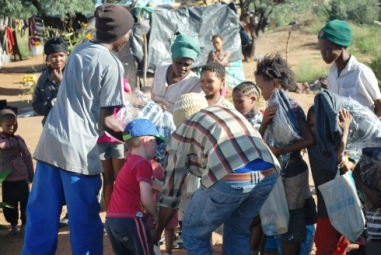
The woman farmer from Ghana was horrified. She asked me to repeat this information several times before it clicked. She had honestly never heard of people coming from overseas and adopting African children (no – she hadn’t even heard of the Madonna or Angelina adoption cases. Poor woman had probably never had the joy of reading a copy of ‘Shallow’ – sorry – I mean ‘Hello’ either.) She said “But they are taking our African children! These are our children! Not theirs to take!” I put it to her that many people think that the poorest children would have a much better life abroad. With loving parents who desperately want a child and who could give so much more in terms of home, food, schooling etc. My pal was having none of this. “It is just stealing our children. We can look after them. If Africa is treated more fairly by the rest of the world with our trade – if we are given a fair deal. We can look after our own!”
She felt that allowing overseas adoption was simply a sticking plaster – a band-aid – to the problems faced by the poorest African children.
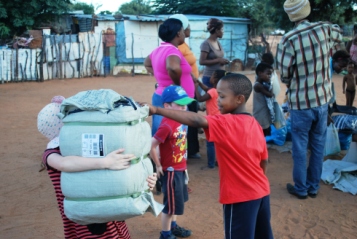
Yet again it made me think more about ‘handouts’ and giving aid and donations and all of that. Was what we were doing during our time in Namibia – as a family and as a community sending help from the UK and Ireland – any different? My day job very much focusses on trying to create long-term livelihoods for poor families overseas. So I know how important sustainable help is where poverty predominates …
But when faced with those tiny little mites who have so little to look forward to in life – your heart tends to run away with you.
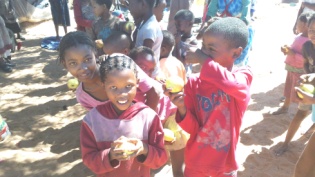
Well, mine did anyway. So, sue me.
MORE SOON …
Thanks, Christina. Your friend’s observation about the foreign adoption of African children cut really close to the heart of things, doesn’t it? No one could fault a person for wanting to care for a desperate child, of course, but at the same time such adoptions (very common where I live) are also a sort of failure of critical thinking. The mammal brain trumps the cerebral cortex yet again. And yet where does the solution lie, if there is to be one, other than in that big part of the brain up above our eyebrows? I look forward to more.
Thanks! A very interesting persepctive indeed!!
I have had such a range of view expressed on this issue via email and fb etc. Such a tough one. For example – I try and operate words on my blog from more of a distance. Trying to balance heart with head. But I also have had to weigh in the factors that;
a) I work in the world of development and therefore have a different take on it all to many
b) I lived and worked with these kids and am aware of the passion, the good, and the problems, the heartbreaks and joys behind such adoptions
c) I seriously thought about international adoption myself but i)I am probably a crap parent to my own biologically-produced two – heaven forbid I inflict my incompetence on a more vulnerable child than mine ii) when I stand at a distance and think about international adoption, I also wonder about the thousands of kids in my own country of residence who need a parent or who need fostering support.
So for me, the serious issue of international adoption lay out of my hands – due to the country that I happened to be living in… it was No Go. Sure, I could have looked into one of the other countries that allow/encourage international adoption – but for me, that lack of ability to whip away the little folk that I had gotten to know so well – slowed me down in relation to my motives.
Am not judging others who took a different approach to me. But the almost-impossibility of it all forced me to get fierce about my own motives.
And I also should mention that;
d) I ended up being able to give birth to own offspring. Although we all take this for granted, it is still a huge privilege. Even if – as me and mine do – you try and view the rest of the world as your own family and who you have an obligation to.
But, oh dear. I still have no answers. Just glad of any interest in any way – of reducing the suffering of our kids.
What a fantastic article! Very informative, emotive and written in a way that jolts even the hardest heart. Thanks for presenting this plight in a way that even a child could understand. Talking of children, I love that snapshot of ‘the little English girl’ clasping supplies almost bigger than herself. What a wonderful example you are to your children! You have implanted in them a compassion that will never leave them and whatever career or job they eventually decide to do, it will reflect your humanitarian, selfless work that will live on through them. I can’t wait to read more. And no, what you are doing is not a sticking plaster. It’s an ointment that is soothing the sores and putting a layer of protection over the wound to help it heal. Don’t let anyone ever make you feel that you’ve been wastung your time. It might be a drop in the massive bucket, but it still counts. Anyone who thinks your work is insignificant is just trying to make themselves feel better for the guilt that knaws at them when they realise that while they are opposing, they are doing nothing. You walk the talk and that is very admirable in itself. The world is a better place because of people like you. xx
thank-you … it took me forever to write all of this up. I wanted to do it ‘on the day’ but (as well as the internet access stuff) I was very mindful that ‘shooting from the heart’ is not always the most helpful way to solving complicated problems!
On the edge of my town is an AIDS orphanage, the motto on their sign says “Somewhere to call home. Someone to call Mother”. I feel sad every time I drive past that place; it’s the kids that get to you, no matter how hard hearted you think you are.
One of the answers to Africa’s poverty lies in aid projects that focus on sustainablily and independence – teaching the people to feed and look after themselves without having to continuously hold out begging bowls. Aid by way of handouts – I’m mostly talking of cash handouts here. Medicines, a different story – perpetuates the ‘neediness’ and dependency of these desperately poor people. And of course cash is easily ‘re-routed’ by corrupt governments! (they probably wont be interested in the kids’ comics though 😉 )
I am with you on that one! That’s exactly what we try and do at the charity I am involved with – The Lorna Young Foundation – http://www.lyf.org.uk and http://www.njatc.co.uk – a lot of our work is born from our time in Africa. Hand-ups….and a move towards income generation. Arghh! Thanks so much for your commment – I can feel a new blog coming on! 🙂